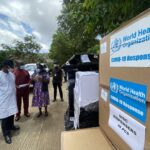Prostate cancer has emerged as one of the largest threats to male health in Nigeria, with 32.8 cases and 16.3 deaths per 100 000 men.
Most men are diagnosed only after symptoms become severe, when treatment is more complicated and far less effective.
Fear, stigma and the general absence of routine health checks for men over 40 contribute to low detection.
In many communities, men avoid hospitals altogether. This continues to fuel thousands of preventable deaths each year.
Early detection significantly improves outcomes for prostate cancer, but screening rates in Nigeria remain depressingly low. Only a fraction of male adults commit to annual PSA and DRE screenings each year.
Awareness campaigns have been inconsistent, and the healthcare system lacks enough specialist centres for regular male cancer screening.
To bridge this gap, Polaris bank launched free prostate-cancer screening initiative, following a successful rollout last year.
The institution has partnered with a specialised clinic to provide 250 men above the age of 40 with free screenings such as PSA blood tests, Digital Rectal Examination and private consultations.
The painless screenings provide easy quick access to healthcare for men, who would otherwise be hesitant to visit healthcare facilities.
More importantly, the initiative removes the cost barrier that prevents many men from proactively monitoring their health.
By combining financial access, medical expertise and community outreach, the model prioritises prevention rather than emergency treatment.
This initiative joins a rising tide of grassroots health interventions nationwide.
In Lagos and Abuja, organisations offer mobile cancer-screening events targeted at older men, while some state ministries are incorporating basic screenings into overall wellness outreach efforts.
Across the continent, South Africa and Kenya are offering free testing to improve detection figures.
While commendable, 250 men merely covers a small fraction of the population and cuts out those in remote areas. Follow-through treatments are also not assured for those who test positive.
Without strong national efforts, such as subsidised screenings annually or robust integration into healthcare systems, long-term outcomes may be futile.
To achieve long-term success will depend on consistent funding, improved awareness campaigns and grassroots alliances.
Nevertheless, Polaris’ initiative proves that lifesaving efforts don’t often need giant healthcare facilities.
Summary not available at this time.






